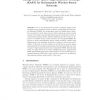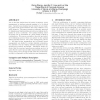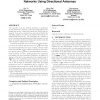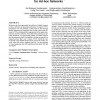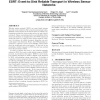141
click to vote
EWSN
2010
Springer
15 years 9 months ago
2010
Springer
Due to non-homogeneous spread of sunlight, sensing nodes typically have non-uniform energy profiles in rechargeable Wireless Sensor Networks (WSNs). An energy-aware work load dist...
EWSN
2010
Springer
15 years 9 months ago
2010
Springer
Radio interference may lead to packet losses, thus negatively affecting the performance of sensornet applications. In this paper, we experimentally assess the impact of external i...
121
Voted
SDM
2009
SIAM
15 years 11 months ago
2009
SIAM
Popularity of mobile devices is accompanied by widespread security problems, such as MAC address spoofing in wireless networks. We propose a probabilistic approach to temporal an...
117
Voted
MOBIHOC
2003
ACM
16 years 2 months ago
2003
ACM
124
Voted
MOBIHOC
2003
ACM
16 years 2 months ago
2003
ACM
The capacity of ad hoc wireless networks is constrained by the interference between concurrent transmissions from neighboring nodes. Gupta and Kumar have shown that the capacity o...
130
Voted
MOBIHOC
2003
ACM
16 years 2 months ago
2003
ACM
Existing works have approached the problem of reliable transport in ad-hoc networks by proposing mechanisms to improve TCP's performance over such networks. In this paper we ...
130
Voted
MOBIHOC
2003
ACM
16 years 2 months ago
2003
ACM
In wireless ad hoc networks, capacity can be traded for delay. This tradeoff has been the subject of a number of studies, mainly concentrating on the two extremes: either minimizi...
108
click to vote
MOBIHOC
2003
ACM
16 years 2 months ago
2003
ACM
It is often useful to know the geographic positions of nodes in a communications network, but adding GPS receivers or other sophisticated sensors to every node can be expensive. W...
144
click to vote
MOBIHOC
2003
ACM
16 years 2 months ago
2003
ACM
Wireless sensor networks (WSN) are event based systems that rely on the collective effort of several microsensor nodes. Reliable event detection at the sink is based on collective...
